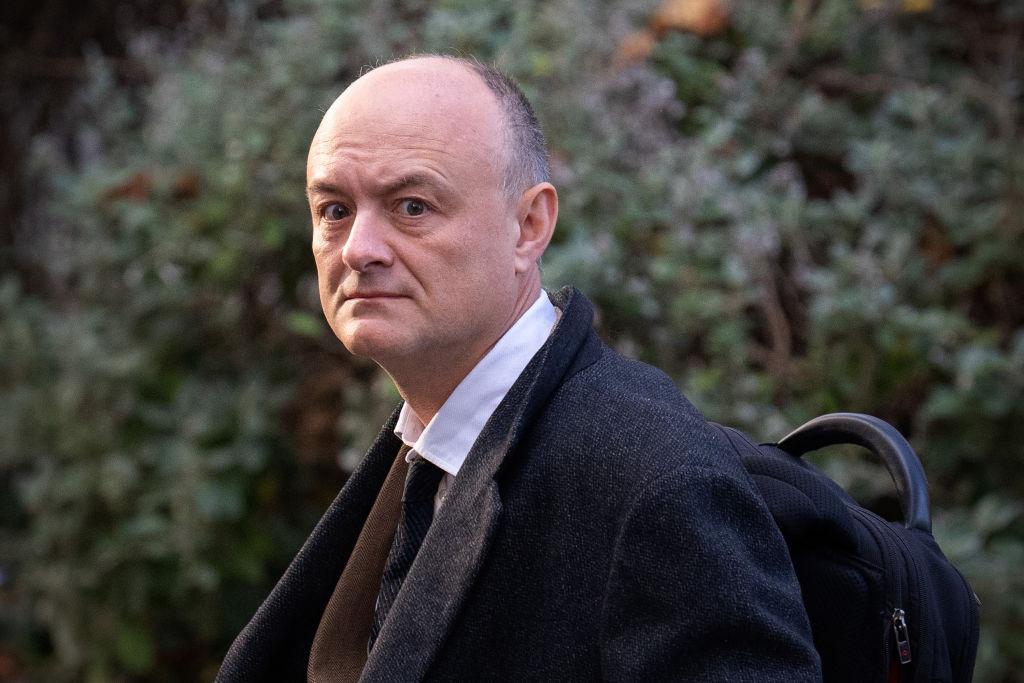Last night, Dominic Cummings was interviewed at the O2 by the activist start-up, Looking for Growth. Cummings walked on stage in his trademark T-shirt and baseball cap and made a series of predictions about UK politics. A general election is unlikely before 2029, he said. ‘It won’t be earlier. The MPs will postpone the nightmare that’s coming to them.’ He warned that Keir Starmer’s time is limited. ‘If Labour keeps losing voters to the Greens, Starmer will be got rid of next year.’ He made the same prediction about the Tory leader. ‘Kemi’s going to be got rid of after the May elections.’
Cummings chuckled over the idea that, ‘the UK is a multicultural success story. That idea is cracking up.’
He seemed amazed by the folly of Starmer’s administration. ‘Nothing he’s done makes any sense.’ One of his first actions as PM was to scrap the winter fuel allowance, ‘which was not on anyone’s list apart from a few officials inside the Treasury.’ Cummings had no expectation that Labour would respond to voters’ concerns. ‘They will double down and keep telling us they were right about everything and have been since 1998.’
He offered advice to Reform about consolidating its lead in the polls. ‘My hunch is that Farage has a huge opportunity if he’s ready to recruit the right people to his party and to say, “here’s how the old system has failed.”’ At present he may be ‘in the driving seat’ but Farage needs to assemble a trustworthy team. ‘The big doubt is that he’s a one-man band with a packet of fags and an iPhone.’ To allay these concerns, Farage should host a press conference alongside his closest advisers and say, ‘here are ten people on stage with me and each of them is obviously better than the people in power.’
Cummings enlarged on the soft corruption of Westminster where most MPs have the wrong priorities. ‘They’re infighting, they’re chasing the news cycle, or they’re pursuing short-term career objectives.’ He cited Rishi Sunak’s failed Rwanda scheme as an example. ‘He couldn’t orient to “what do the voters think.” And he spent a year twisting and turning in response to Pundit World.’
The key problem is the cultural divide between the elites and everyone else. ‘The less educated you are, and the less attention you pay to politics, the more likely you are to be correct. The richer and better educated you are, the more likely you are to be wrong.’
He noticed this during the Brexit referendum when the Remain campaign, led by David Cameron and George Osborne, was widely supported by self-appointed media experts. ‘The more stupid the thing that they did, the more it was praised by the stupid pundits.’
Today the blinkered dogmatism of the commentariat – which he sometimes calls ‘blue sky world’ – is being perpetuated by Rory Stewart and Alastair Campbell.
‘Rory champions pretty much every idea which is dying. You’ll find him and Campbell imagining that – through their collective will – they can turn the clock back to 1998 with Blair and Clinton in charge.’
He said that the ‘fall of the expert’ was part of a revolutionary cycle that occurs every 50 or 70 years. In the first half of the 19th century, the winners of the Napoleonic wars set about reordering Europe, ‘but by the 1840s, their ideas don’t seem to work and the institutional systems are falling apart. And suddenly you have revolutions in 1848.’
At present we’re witnessing the slow collapse of the institutions created after 1945. ‘They’re crumbling,’ he said, ‘and they can’t cope with the forces operating in the world. The more they act, the more they drive themselves into crisis.’ The death of the centralised media has been long and painful. In the middle of the 20th century, during ‘peak centralisation,’ it was possible for ‘consensus reality’ to be manufactured and accepted. ‘Stalin can delete a person and he vanishes. The BBC decrees that “x” is a fact and no one questions it.’
In the 1990s, the internet started to ‘break up these centralised institutions’ by exposing them to scrutiny which undermined the elites. Mistrust in the EU is growing. Fewer people now support the policies clustered around the slogan, ‘diversity is our strength.’ Cummings chuckled over the idea that, ‘the UK is a multicultural success story. That idea is cracking up.’
He said that the capture of our institutions by left-leaning activists reflects the failure of conservative thinkers to communicate their ideas. ‘The right has been hopeless at political warfare for 200 years.’ Even today, the left has better recruitment tactics than their opponents. Right-leaning talent moves into business and finance. Left-leaning talent moves into politics and the media.
He finished with a final prediction. ‘It could be that this time next year the Tory party has essentially closed down.’








Comments